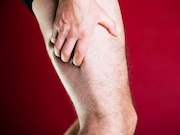Belief in a long recovery, many symptoms attributed to pain negatively tied to improvement
WEDNESDAY, June 20, 2018 (HealthDay News) — In back-related leg pain and sciatica patients, belief in a long recovery and the number of other symptoms attributed to the pain are independently negatively associated with improvement, according to a study published in the June issue of The Spine Journal.
Kika Konstantinou, Ph.D., from Keele University in the United Kingdom, and colleagues assessed prognosis and prognostic factors in 609 primary care patients with low back-related leg pain and sciatica. Questionnaires, clinical assessments, and magnetic resonance imaging (MRI) scans were analyzed and patients were followed for 12 months.
The researchers found that at the end of the study period, 55 percent of patients improved in both the total sample and the sciatica group. Longer leg pain duration (odds ratio, 0.41), higher identity score (odds ratio, 0.70), and a patient’s belief that the problem will last a long time (odds ratio, 0.27) were the strongest independent prognostic factors negatively associated with improvement for the whole cohort. In the sciatica group, the last two factors were negatively associated with improvement.
“In the long term, patients’ belief that they will get better soon, and not having many other complaints attributed to the back and leg pain, were independent prognostic factors associated with improvement,” the authors write. “These prognostic factors can be used to inform and direct management decisions about timing and intensity of available therapeutic options for symptoms relief, especially in sciatica patients with corroborative MRI findings, for whom there are potentially appropriate therapeutic interventions that are not applicable for patients with non-specific low back and leg symptoms.”
Copyright © 2018 HealthDay. All rights reserved.








